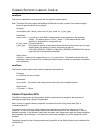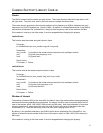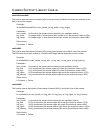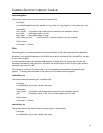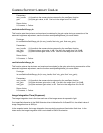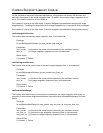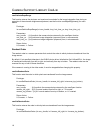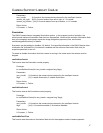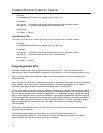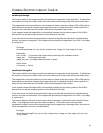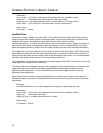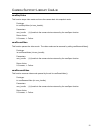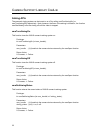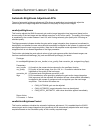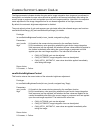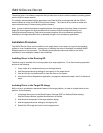
18
C
AMERA
S
UPPORT
L
IBRARY
C
AM
L
IB
Prototype:
int camSetMinFlashTime(int cam_handle, long min_time_µs);
Parameters:
cam_handle - [in] handle to the camera device returned by the camOpen function.
min_time_µs - [in] minimum illumination time, in microseconds.
Return Value:
0: Success; -1: Failure
camGetMinFlashTime
This function returns the minimum illumination flash time for the snapshot mode of camera operation.
Prototype:
int camGetMinFlashTime(int cam_handle, long *min_time_µs);
Parameters:
cam_handle - [in] handle to the camera device returned by the camOpen function.
min_time_µs - [out] minimum illumination time, in microseconds.
Return Value:
0: Success; -1: Failure
Image Acquisition APIs
The IS4910 camera has a set of image acquisition and aiming APIs. These are the functions an
application can call to acquire images in snapshot or video modes, or to turn the aiming system on or off.
Note: In order to take pictures or to start, pause or stop the video mode the camera must be in fully
power state (D0).
Note: On power-up, the IS4910 camera is automatically programmed for the snapshot mode of operation.
In the snapshot mode, the functions camAcquireImage() or camAcquireImageEx() can be called to
execute a single image acquisition and deliver the image data to the application.
To turn the camera into the video mode, the function camStartVideo() must be called. When the camera
is in the video mode, the functions camAcquireImage() or camAcquireImageEx() can be called to deliver
the most recently acquired video frame to the application. If an application needs to change the camera
gain or image integration time or perform an automatic image brightness adjustment while the camera is
in the video mode, the camera must be paused first by calling camPauseVideo(), and after the change is
made, the video mode can be resumed by calling camResumeVideo(). Note that if any other changes
need to be made while the camera is in the video mode, the video must be stopped by calling
camStopVideo().
The function camStopVideo() stops the video mode and automatically turns the camera back into the
snapshot mode of operation.
The camera’s aiming system can be turned on or off by calling camTurnAimingOn() or
camTurnAimingOff() respectively. Note, however, that even if the aiming is turned on, the function
camStartVideo() turns the aiming off until the video is stopped.



